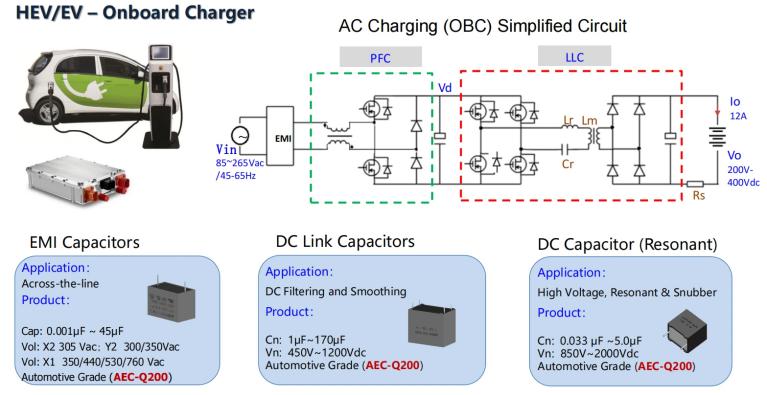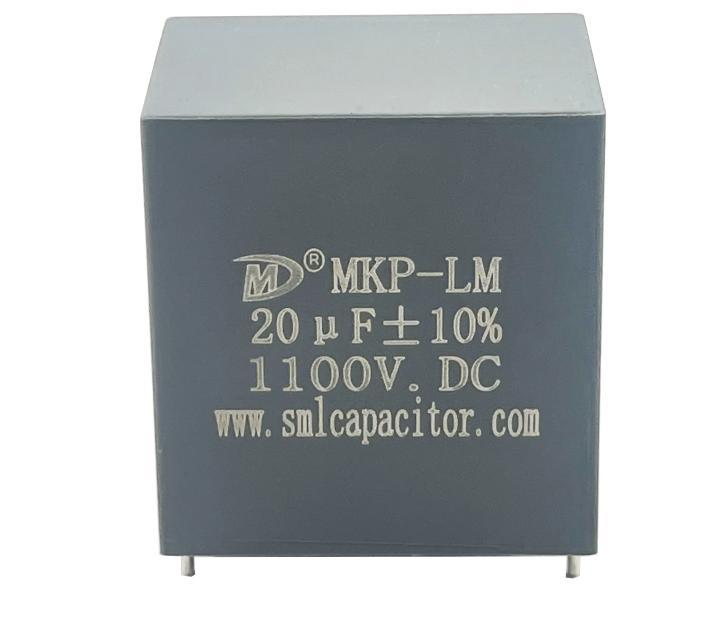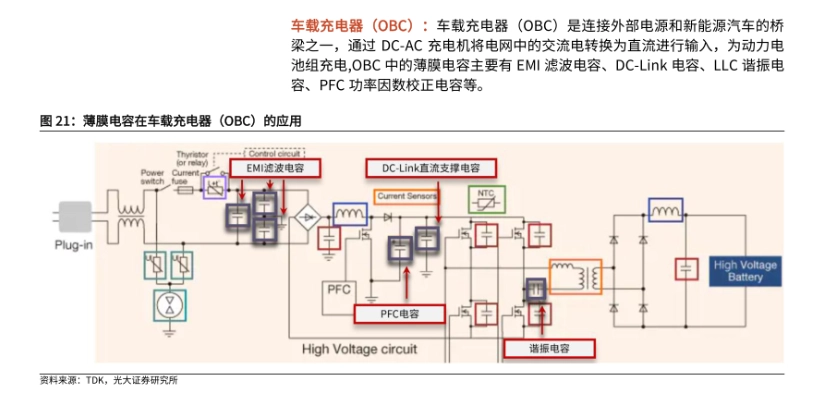Capacitors are key parts of EV chargers. They store energy for smooth power delivery. They handle the link between the power source and the EV battery. This is vital in high-power charging. It keeps the energy flow steady. DC Link Capacitors are often used here. They filter and smooth DC power well. With capacitance from 1μF to 600μF and voltages from 450V to 1200Vdc, they fit automotive-grade systems.
In fast-charging stations, capacitors balance loads during peak times. This cuts energy waste. It prevents grid overloads or stops. They also make systems more reliable by handling quick power changes.
Capacitors keep the voltage steady in EV chargers. They catch spikes and fix dips. This protects delicate parts from harm. It's crucial in fast charging with high voltages. Snubber Capacitors stop sudden voltage jumps. They shield sensitive components in the charger.
Stable voltages protect chargers and vehicle systems. This extends their life. It also ensures safe, smooth charging for users.

Onboard chargers (OBCs) in EVs and HEVs rely on capacitors. They handle AC grid power changes to DC for batteries. Grid or load shifts can cause power-ups and downs. Capacitors smooth these issues. They ensure steady power to the battery.
EMI Capacitors cut electromagnetic interference (EMI). This keeps signals clear. It avoids disruptions in vehicle electronics. They work for across-the-line tasks with capacitance from 0.001μF to 45μF. They have ratings like X2 305 Vac or Y2 300/350Vac.
Capacitors boost energy efficiency in EV chargers. They cut ripple currents and steady voltages. This reduces energy loss in power transfer. For example, DC Capacitor (Resonant) types are used in high-voltage resonant tasks. They offer capacitance from 0.033μF to 5.0μF and voltages up to 2000Vdc.

They also protect against surges and transient events. This prevents damage to sensitive parts. In actual projects, these capacitors keep systems stable under tough conditions.
Fast-charging stations need strong parts. They handle big power demands daily. Capacitors keep energy flow steady. DC Link Capacitors are vital. They smooth out direct current. They cut voltage ups, downs. Power stays even between steps. This boosts energy flow fast. Systems run well at peak.
In real setups, good capacitors excel. They charge cars quickly, safely. Voltage and current hold firm. This lowers wear on parts. Overheating risks stay low too. Automotive-grade capacitors fit tough jobs. They handle heat, last long. They work in harsh weather. These suit busy charging stations.
Reliable DC Link Capacitors ensure safety. They keep charging quick, steady. This helps electric vehicle growth. Stations spread worldwide with ease. Capacitors ease system stress well. They protect parts, cut costs. Long life reduces replacement needs. Efficiency aids the planet too. Chargers stay cool under load. Systems avoid sudden power drops. This keeps stations running smoothly. High-quality capacitors improve performance. They support heavy use daily. Stations stay safe for users.
Residential EV chargers use capacitors on a smaller scale. They stabilize voltages and cut noise during charging. This gives homeowners a smooth charging experience. It protects home electrical systems from issues.
EMI Capacitors tackle electromagnetic interference. They meet strict standards like AEC-Q200. They boost reliability in home chargers and follow rules.
SMILER capacitors are built for tough EV charger conditions. They handle high heat, humidity, and stress. They use automotive-grade materials meeting AEC-Q200 standards. They stay reliable for years. DC Link Capacitors, with capacitance from 1μF to 600μF and voltages from 450V to 1200Vdc, show this strength. They suit DC filtering and smoothing. High-quality materials resist wear. This keeps chargers efficient and safe.

SMILER capacitors stay steady under high heat. They work well under heavy loads. This is key for fast-charging stations and OBCs in HEVs and EVs. DC Capacitor (Resonant) types are made for high-voltage resonant tasks. They have capacitance from 0.033μF to 5.0μF and voltages up to 2000Vdc. They cut energy loss and handle tough conditions.
This technology ensures chargers work safely and efficiently, even during peak use.
SMILER capacitors excel in real-world EV charging projects. Many Chinese automakers used in OBCs and fast chargers. In one fast-charging station, EMI Capacitors cut interference. With capacitance from 0.001μF to 45μF, they meet AEC-Q200 standards. They ensured smooth operation and happy users.
Residential chargers with SMILER capacitors stabilize voltages and reduce noise. They handle power shifts and EMI well. They offer reliable, efficient home charging solutions.
Q: What types of capacitors are used in EV chargers?
A: DC Link Capacitors for filtering, Snubber Capacitors for spike protection, and EMI Capacitors for cutting interference.
Q: How do capacitors improve fast-charging station performance?
A: They stabilize voltages, cut energy loss, and keep power steady during peak times.
Q: Can residential EV chargers benefit from capacitor technology?
A: Yes, EMI Capacitors stabilize voltages, cut noise, and meet standards.
Q: What makes SMILER capacitors suitable for EV chargers?
A: They offer durability, thermal stability, and strong performance under load, meeting AEC-Q200 standards.
Q: How do DC Link Capacitors improve EV charger functionality?
A: They filter and smooth DC currents for efficient, reliable energy delivery.
Q: Are there specific applications where resonant capacitors are essential?
A: Yes, they're key for high-voltage resonant tasks like snubber circuits.